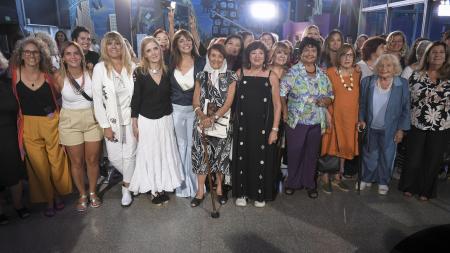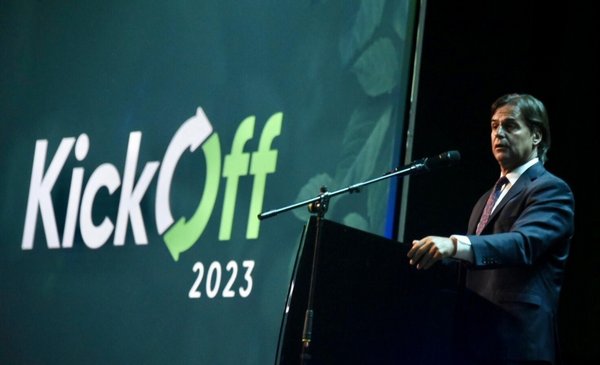The exhibition “Mujeres Argentinas”, in commemoration of International Women’s Day, was inaugurated this Thursday afternoon on Public Television, where they recognized the work of those “they left their mark and opened paths”, and as a celebration for 40 years of democracy.
In collaboration with the National Fund for the Arts (FNA), the exhibition of plastic artists was inaugurated and, in addition, a video was shown in which officials, legislators and personalities from different fields such as economic, political, rights humans, culture, and gender.

The material, produced by the Directorate of Gender and Diversity of Radio and Television Argentina (RTA), in charge of Susana Sanz, and Public TV, has the testimonies, among other personalities, of Kelly Olmos, Minister of Labor, Employment and Social Security; Victoria Tolosa Paz, Minister of Social Development; Ayelén Mazzina, Minister of Women, Gender and Diversity; Carmen Storani, former president of the National Council for Women and Dora Barrancos, adviser to the Presidency of the Nation.
Also by Malena Galmarini, president of AySA, Diana Saiegh, president of the National Endowment for the Arts; Juliana Di Tullio, national senator for the province of Buenos Aires; María de los Angeles Sacnún, director of the Investment and Foreign Trade Bank; the cook and television host Ximena Saenz; Ada Veiga Ricco, president of the Taxi Drivers Cooperative.
It also includes María Fiorentino, from the Argentine Actresses Collective; Ana Panasiuk, first reflector of Public Television; Sandra Ceballos, coordinator of the Area for Indigenous Peoples of Radio Nacional and columnist for Televisión Pública and journalist and editor Clauda Acuña, the first woman to win the King of Spain Award.

Rosario Lufrano, president of Radio and Television Argentina (RTA), said that “It is a special commemoration because it is framed in these 40 years of democracy”, and for this reason the inaugural video was titled “Footprints… opening paths”.
“These are women who have left their mark, who have opened paths, and continue to do so. It is important that there be a reflector, a camerawoman, or directors. Opening doors means giving the possibility to so many women who have not had it in these years “, he explained.

For her part, the president of Télam, Bernarda Llorente, considered “The act for the 40 years of democracy is very important because it gave voices to women who during all this time did a lot to make democracy not only possible, but to deepen and improve”.
“When one goes through those years, one realizes that democracy is a context where many things can be achieved if objectives are set. Those 40 years have been of struggle, opening spaces, setting objectives and conquering rights. Women are a bulwark fundamental and we will only have a better democracy when we have full and equal participation,” he added.
In turn, Taty Almeida, from the Mothers of the Plaza de Mayo Founding Line, asserted that “We check the places that we have won and the positions that are occupied. So I ask myself, once again: who said that we are the weaker sex?”.

Meanwhile, Miriam Lewin, Public Defender -in dialogue with Télam- said that “in the video there were taxi drivers, reflectors, cooks, women in charge of SMEs, you realize the progress, but also everything that is missing in terms of of recognition and our image in the media and in society. It seems that we still have to be taking the exam much more than men”.
Jésica Tritten, general manager of public content, maintained that Public TV has an “almost priority role” and highlighted “everything we can do to expand rights, not only for women, for dissidents, but for the rights of the popular sectors”.

The exhibition begins its journey with the work “Santa Evita”, a portrait of Eva Perón made by Cristina Ruiz Guiñazú, and has a diverse number of works ranging from digitized photographs, in color, analytical collages, paintings with plastic pearls, wood and glass, and even a sculpture made with electric welding titled “What are you looking at?”, in which a female figure can be seen sitting on a chair with crossed legs and shoes.
The exhibition includes works by Silvia Sergi, Zulema Maza, Nora Iniesta, Karina El Azem, Vanina Prajs, Paula Bottini, Florencia Fraschina, Ana Lía Werthein, Liliana Golubinsky, Alejandra Cesaro, Cristina Ruiz Guiñazú, Aída Carballo, Guadalupe Milles, Nora Chirom, Angeles Ceruti, Daiana Infante and Ingrid Ana Overgaard.

Finally, it was reported that “Mujeres Argentinas” will be open to the public until April 3 at the Public TV building, Avenida Figueroa Alcorta 2977, CABA.


















